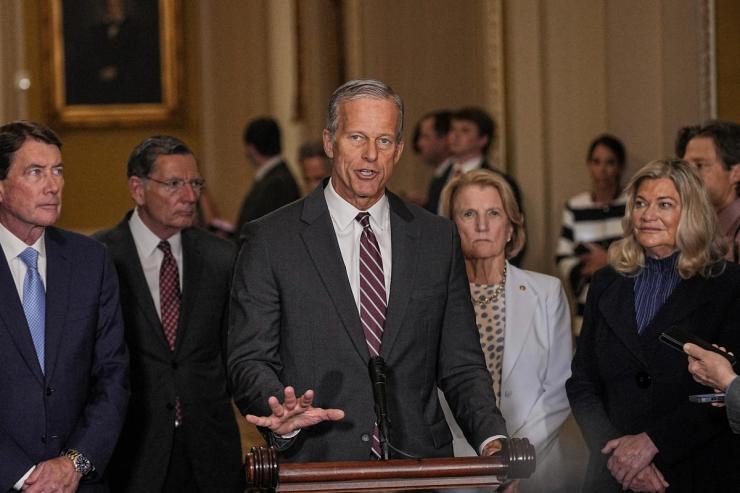The Scoop
Senate Republicans are hotly debating whether to do a full teardown of the House’s sweeping tax and spending bill, or gently renovate it. Right now, the renovators are winning out.
The upper chamber is likely to make substantive changes to the House-passed tax cuts legislation, according to interviews with a half-dozen GOP senators on Thursday. And they won’t be on small matters.
But the idea of tearing up the bill and passing something wildly different isn’t exactly catching on, even among those who have issues with President Donald Trump’s megabill.
“I don’t know about blowing things up,” Sen. Lisa Murkowski, R-Alaska, one of the more independent-minded senators, told Semafor.
“You can kind of see the writing on the wall here. You’ve got Republicans in the House that have been able to move something out. You’ve got a Republican majority here, and you have a president who very clearly wants this to pass,” Murkowski added.
Count her among those who want to change the House bill’s Medicaid language, a hot topic among Republicans who are worried about coverage losses and hospitals closing. She also wants to take a look at the House’s quick phase out of Biden-era clean energy tax credits.
Senate Republicans are also looking at slashing the House’s generous state and local tax deduction, or SALT, changing its spectrum auction language and potentially beefing up the child tax credit. But House and Senate leaders have been coordinating for weeks, and Republicans believe there’s a decent chance that the Senate passes something that closely resembles what the House passed on Thursday morning.
“There’s been a lot of coordination,” said Sen. John Hoeven, R-N.D., after the GOP’s first party meeting since House passage. “There’s going to be some changes, but they’ve laid down a good bill, and, you know, we make sure it fits our rules and I believe we’re going to make some changes and pass it.”
The Senate has a goal of passing its bill by July 4, which would give them four weeks after next week’s recess. That would require not just negotiating a bill that gets 50 votes but also navigating the unlimited Senate vote-a-rama and making sure the parliamentarian signs off on the bill’s filibuster protections.
It’s a tall order, but after seeing Speaker Mike Johnson and Trump jam through a bill after a week of bellyaching from holdouts, it no longer seems crazy.
“There will be a Senate viewpoint and changes. There will be a lot of similarities, but there’ll be differences,” said Sen. Shelley Moore Capito, R-W.Va. “It’s too early to tell how big and broad the differences are going to be.”
Know More
Some Republicans want huge structural changes to the bill. Sen. Rand Paul, R-Ky., wants to strip the debt ceiling out and others want far larger spending cuts.
“I’m not going to vote for it with minor tweaks. I think everybody’s kind of happy talking and ‘get together and pull together and gotta do this’ and that crap. That’s the way they’re going to try to make it go,” said Sen. Ron Johnson, R-Wis. Whether he can make bigger changes, he said, “depends whether we’ve got four people saying: ‘No, we’re mortgaging our kids’ future, it’s immoral and it’s gotta stop.’”
Johnson mentioned Paul along with Sens. Rick Scott, R-Fla., and Mike Lee, R-Utah, as aligned on the issue. Republicans can afford to lose only three votes on the Senate floor and still pass the bill.
But after Trump overcame similar obstacles in the House, it’s now the Senate’s turn to contend with the White House’s pressure campaign. And Sen. Josh Hawley, R-Mo., said that the chamber should try to pass a version of the bill that the House can accept, rather than ping-ponging the legislation back and forth.
That all depends on what sort of changes the House can stomach. Hawley calls a co-payment requirement on some Medicaid beneficiaries a “sick tax” and wants to take a look at the “provider tax” that could threaten hospitals, Capito said clean energy tax credits “have created jobs, really good jobs, and good companies. So we want to make sure we do it right.” And Hoeven said some of the House bill’s agriculture policy is at risk because Senate rules on so-called budget reconciliation bills could knock it out.
“Spectrum is going to be corrected,” said Sen. Mike Rounds, R-S.D., who wants to enshrine protections to certain bands from spectrum auctions. “Everybody’s acknowledging it has to be changed. I think the House was expecting us to do the fix.”
House leaders have been trying to convince the Senate not to change the bill too much. But, Capito said, “I think they expect” some changes. After all, the Senate’s been telegraphing them for a while.


